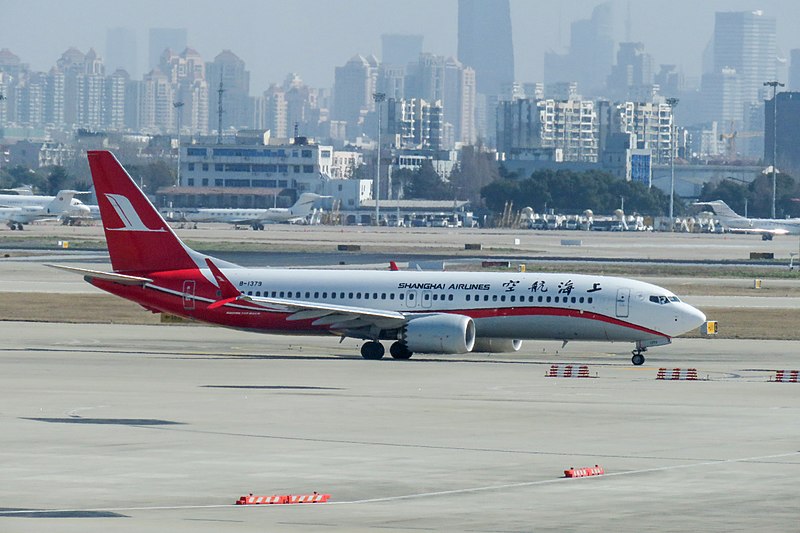Ethiopian Airlines Flight 302 Crashes, Raises Questions About Boeing’s 737 Max
After Latest Plane Crash, FAA Takes A Second Look At Boeing’s New Model
https://commons.wikimedia.org/wiki/File:B-1379@SHA_(20180212105057).jpg
A Shanghai Airlines Boeing 737 MAX 8, the same model as Ethiopian Airlines Flight 302, taxis down the runway at Shanghai Hongqiao International Airport.
The date is March 10th, 2019. The time is 8:44 in the morning in Ethiopian time, and air traffic controllers at Addis Ababa Bole International Airport are scrambling. They’ve been busily working for the last three minutes to divert incoming flights from the runway so that a plane that had reported technical difficulties could make an emergency landing. The reason that they’re scrambling now, however, is because that plane just disappeared from the radar. At 8:44, this plane, Ethiopian Airlines Flight 302, had just crashed near the village of Bishoftu, six minutes after takeoff, with 157 people on board. There were no survivors.

Abiy Ahmed, Ethiopia’s current Prime Minister, has offered his condolences to the families of the victims.
The tale of this crash begins merely one minute after takeoff, when the pilot reported what was described as a “flight control problem,” though it was decided that the flight would continue. Two minutes later, however, the aircraft accelerated well beyond its safety limits and the pilots requested permission to return to the airport. By the time the aircraft had been in the air for 6 minutes, it had reached an altitude of 9,000 feet and the rate of climb and descent had begun to fluctuate. It crashed shortly thereafter, with eyewitnesses describing “strange noises” and a plume of white smoke trailing the plane. The loss of the 149 passengers and 8 crew on board Flight 302 was the deadliest aircraft accident in Ethiopia to date, surpassing the crash of an Ethiopian Air Force Antonov An-26 in 1982 that killed 73 Ethiopian, Libyan, and Cuban troops. It has devastated the nation, and the Ethiopian Parliament has declared March 11th as a day of national mourning.

Christain Henkins, 18, has offered up his opinions on Boeing’s latest model for this article
In light of this crash, government regulators are raising questions about the airworthiness of the Boeing 737 MAX 8. The crash of Flight 302 marks the second mass-casualty event involving this model of plane in five months, the other being the crash of Lion Air Flight 610 in Indonesia in October of 2018, resulting in the deaths of 189 people. Due to the concerns over the model, all 376 of the planes, one of the newest models in Boeing’s fleet, have been grounded. Though the Federal Aviation Administration had previously said that there was no cause for concern with the model, it has since modified its stance, releasing statements saying that it is believed that the causes of the crashes were similar enough that changes need to be made to the models before they will be flightworthy once again. In addition to this grounding, several countries have imposed an airspace ban on the aircraft, meaning that newly produced 737 MAX 8s are essentially prohibited from leaving the factories until changes are implemented.

George Haramis, 18, expresses his opinion on recent events involving the 737 MAX 8.
With the FAA’s reversal of its initial verdict on the safety of the 737 MAX 8, many are questioning why initial safety testing and investigations did not reveal any of the safety concerns that have been brought into the spotlight as a result of the Lion Air and Ethiopian Airline crashes. This has resulted in the U.S. Department of Transportation (DOT) Inspector General beginning an investigation into why the FAA initially declared the aircraft safe, despite safety concerns for the model. Furthermore, a federal grand jury has issued a subpoena on behalf of the U.S. Justice Department for any documents related to the development of the Being 737 MAX 8 to investigate additional wrongdoing. Supplementary investigation has revealed that numerous pilots across the U.S. reported handling issues with the aircraft, with some reporting problems strikingly similar to what happened in the Lion Air crash.

David Berry, 18, was another student interviewed for this article.
And what do Lafayette students think about the situation? George Haramis, an eighteen-year old senior, speculated, “I think it’s really weird that the FAA is doing all this shady stuff, and it seems like they only want to help Boeing and are backing out now because they don’t want to get caught doing what they’ve been doing.” This sentiment seems to be fairly common, as David Berry, another senior, says “This makes me never want to fly on a Boeing airplane again.” In simpler terms, Christian Hankins, another member of Lafayette’s class of 2019, declares “The Boeings are trash.” After analyzing all of this, the feelings towards Boeing seem pretty clear. Hopefully, the victims of these two plane crashes did not die in vain and they will usher in a new era of safety in the air travel industry.




